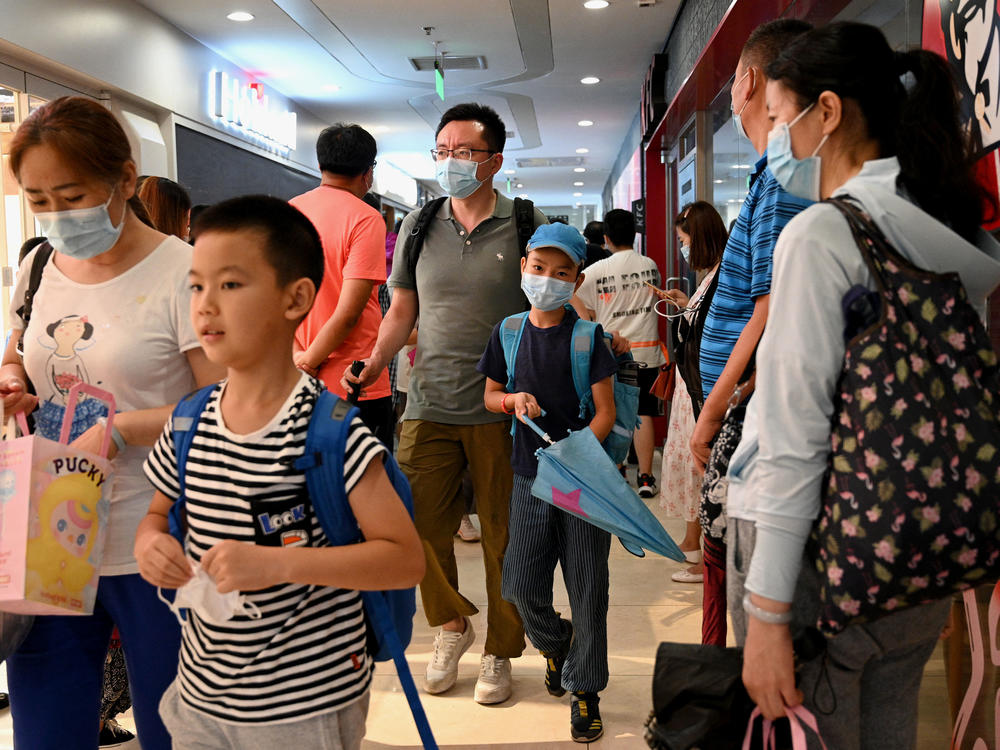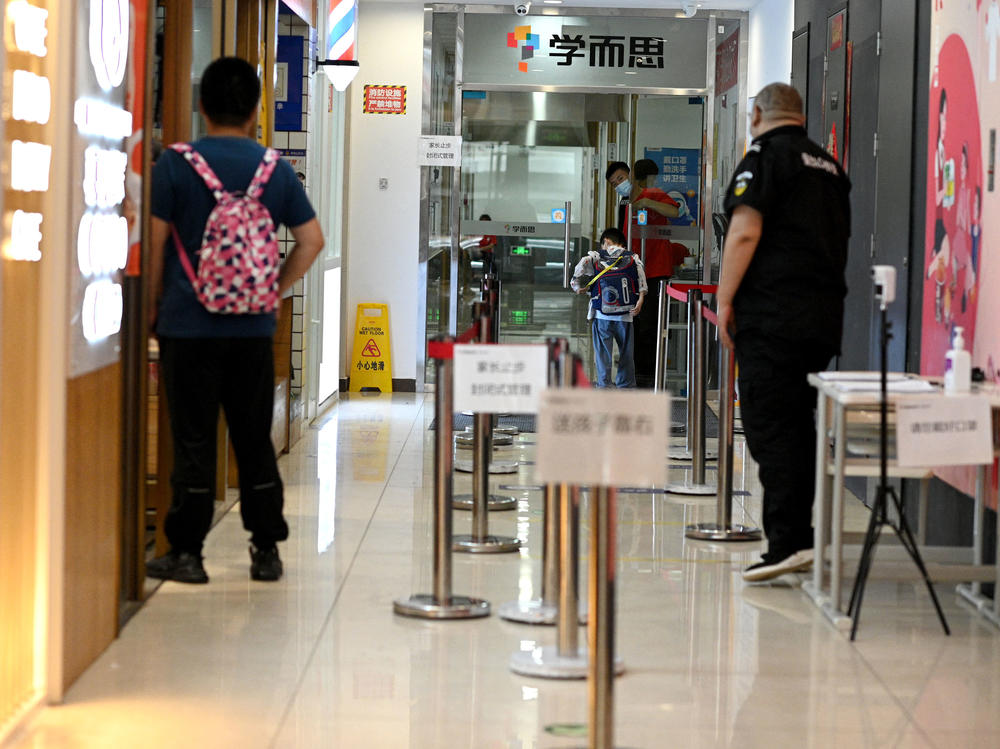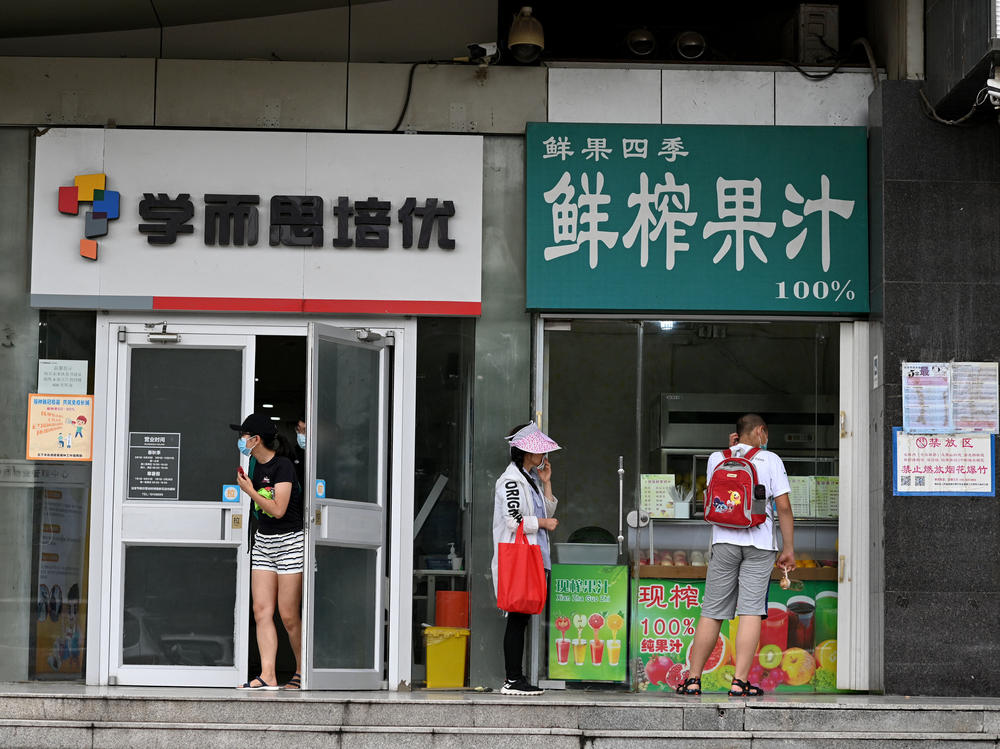Section Branding
Header Content
Forget Tiger Moms. Now China's 'Chicken Blood' Parents Are Pushing Kids To Succeed
Primary Content
BEIJING — They schedule their children's days in 15-minute increments. They scour online forums and swap tips on the most exclusive tutors and best sports coaches. Some even buy second homes next to the best public schools.
Forget Tiger moms. These are China's jiwa or "chicken" parents, who are known for their attentive — some say obsessive — parenting style. The term is used to describe aggressive helicopter parenting, and comes from an unproven Chinese medicine treatment dating back to the 1950s, in which someone is injected with fresh chicken blood to stimulate energy.
Jiwa parenting culture, a relatively new phenomenon, is now in the crosshairs of Chinese authorities. At a time when the government wants to see families having more children and raising more future workers, it fears that hyper-competitive parenting pressures — combined with the meteoric growth of China's private education sector, now worth billions — are deepening inequality and discouraging couples from having larger families, a priority of the country's new three-child policy.
As more parents complain about the burnout brought on by jiwa culture, there's concern that the financial and emotional toll is making many reluctant to have a second, much less a third, child.
The government is limiting private after-school classes
A desire to stay ahead and the belief in the power of education mean many Chinese families spend, on average, between one fourth and nearly half of their incomes on supplemental education activities, helping fuel the success of private education companies worth billions, such as New York Stock Exchange-listed TAL and language tutoring startup VIPKid.
In July, the Communist Party and the State Council implemented sweeping rules to curtail the number of private after-school classes in which parents can enroll their kids. All education companies must register as nonprofits, and no new licenses will be issued to tutoring agencies catering to elementary and middle school students.
But the new rules have only made some jiwa parents more determined to maximize their kids' chances of success.
"Because of these policies, parents are even more convinced of the potential [risk] for social immobility," says Rainy Li, a Beijing jiwa parent of two daughters, one 11 years old and the other a toddler. "They are more eager than ever to propel their kids into elite circles, and more willing than ever to cut back on their own spendings in order to invest in their children."
Some jiwa parents are more laid-back than others
Li's days begin at 6 a.m., when she prepares to send her older daughter to school. At 3 p.m., she picks her up. Then there's dance practice, an online math class and a swim session. They sometimes eat in the car in between activities. At 11 p.m., Li can relax and see her husband.
Not all jiwa parents are alike. Li, who lives a central Beijing district, considers herself relatively laid-back, far less rigorous than the jiwa of Shunyi, a northeastern Beijing district where parents are infamous for splurging on expensive extracurricular activities like tennis, Math Olympiad coaching, ballet, and cram classes that last until 10 or 11 p.m.
In Haidian, the city's university district, jiwa parents have a reputation for being test-crazed.
"I have encountered some Haidian jiwa before. They are kind of desperate," says Li. "They care very little whether their children enjoy what they do. We sort of look down on them."
Some jiwa parents are wealthy. But many come from humble backgrounds and worked hard as China's economy boomed. Now they want to give their children every advantage possible, especially as China's society gives way to growing class inequality.
Jiwa parents insist they only have their children's best interests at heart. But even those who don't self-identify as jiwa push their kids hard.
"We all wish for our children to attend a good university, and hope that our children will discover and develop their true interests," says Audrey Wang, a mother of two daughters in Beijing. She affiliates with yet another Chinese parenting faction: the foxi, or Buddhist style, which is relatively relaxed and holistic.
But she concedes that her daughters do need some pressure to succeed: "I do not think my children are as good as I was when I was a kid. They just do not possess the competitiveness and willingness to struggle." And, she says, most of her focus is on her older child. "We just physically are not able to expend the same amount of energy on our daughter No. 2. I can only make sure she's at home and has food to eat."
Peer pressure for parents of preschoolers
The race to stay ahead of the curve begins as early as preschool, with Beijing parents signing up their tots for elementary school-level math and English classes, costing usually between $80 and $150 an hour. (Some sports or dance teachers demand a minimum payment of $3,000 a month). The classes are preparation for testing into the most selective secondary schools and universities, many of which are in the Haidian district.
Amber Jiang, a Haidian mother, is the bestselling author of a parenting book that describes her fellow jiwa parents as "the strong feasting on the weak."
"Why do people bend over backwards to get into the top schools in Beijing? I don't care much for the brand name [schools], but I care about the educational environment. Parents have group chats, so you learn by doing what others are doing," says Li.
Even parents who vow not to fall prey to the jiwa frenzy say they find themselves swept up by the social expectation to keep up.
"I had no plans when I had my daughter," says Isabella Liang, the mother of a 9-year-old in Shanghai. But she quickly saw other parents bragging about their toddlers' extracurricular activities on social media and felt pressured to sign her daughter up for similar activities as well.
"I discovered the other children were learning all this extra material, and my daughter did not know how to do anything," she says. "I worried that if she did not take these classes, she would not be able to keep up with the other children."
Now her daughter does sports and takes drawing classes. Liang is also considering signing her up for singing classes as her daughter's voice "is no longer so off-key." They tried golf and piano, but the teachers quit, saying her daughter did not follow instruction.
Beijing-based education bloggers Xiaohua and Zhao Juan, who film instructional videos on how to teach young children English, spend a good part of their days calming down jiwa parents.
"It's not a very easy task because you know how crazy — or passionate, let's say — some Chinese parents can be. They always ask me, 'Oh, my kid has been listening to [English] stories for a week, when can she speak?'" says Xiaohua.
The pressures can be enormous, says East China Normal University psychologist Lixin Ren, who has studied the jiwa phenomenon.
"Every time I hear the word [jiwa], I feel a very strong sense of anxiety, stress, fear and exhaustion," she says. For parents, she says, the sense is "I feel that if I don't move forward, I will fall behind."
And while jiwa culture may be heavily commercially developed in China, widening social inequality is linked to educational competition around the world, says Xuan Li, a parenting psychologist at NYU Shanghai.
"Of course you don't want your child to, in any case, fall into the abyss of poverty or lifetime adversity. You want them to at least survive and thrive well," she says.
Parents and teachers are skirting the new government rules
Beijing's new set of regulations, known as the "Double Subtraction," are intended to reduce students' crushing homework load and after-school tutoring hours — the two key issues that the central government believes are "harming the public interest" and exacerbating "a feel of anxiety among parents."
To enforce the new rules, local governments say they are launching a months-long campaign to police the private tutoring market. A recent raid in Anhui province busted a public school teacher giving a private lesson in his mansion. In Hubei province, the same agency tasked with removing adveritising content that's deemed pornographic is now responsible for taking down private tutoring ads.
Yet diehard jiwa parents say those with means will still find a way to schedule one-on-one tutoring for their children.
Rainy Li says the best teachers at her local Beijing public school have already approached her to offer such a service, under the radar, charging $300 an hour. She declined to say whether she herself would take the teacher up on their offer. But of course, she says, there will be parents willing to pay.
Amy Cheng contributed research from Beijing.
Copyright 2021 NPR. To see more, visit https://www.npr.org.



